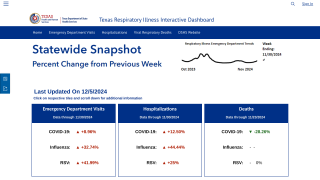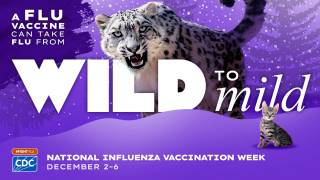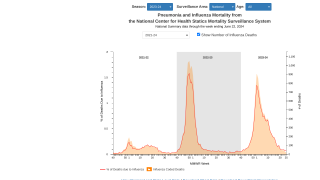Flu-Related Fatalities Reach 80K During 2017-18

According to the Centers for Disease Control and Prevention (CDC), there were an estimated 80,000 Americans influenza-related complications during the 2017-18 season.
And, a much higher fatality toll from influenza viruses in at least 4 decades.
Last fall and winter, the USA flu season was driven by a kind of flu that tends to put more people in the hospital and cause more deaths, particularly among young children and the elderly, said the CDC.
Dr. Robert Redfield, the director of the CDC, revealed this total in an interview with The Associated Press.
In recent years, flu-related deaths have ranged from about 12,000 to — in the worst year — 56,000, according to the CDC.
Separately, the CDC reported a total of 180 influenza-associated pediatric deaths for the 2017-2018 season on September 14, 2018.
Flu is so common that not all flu cases are reported, and flu is not always listed on death certificates. So the CDC uses statistical models, which are periodically revised, to make estimates.
CDC officials called the 80,000 figure preliminary, and it may be slightly revised.
As of early December 2018, 185 pediatric deaths were reported during the 2017/2018 influenza season.
Moreover, less than 60 percent of these pediatric fatalities had received the flu vaccine, reported the CDC.
Recently, a new study suggests that the effectiveness of inactivated influenza vaccine wanes during the course of a single season.
This study was published in Clinical Infectious Diseases, and compared persons vaccinated 14 to 41 days prior to being tested for influenza in persons vaccinated 42 to 69 days prior to being tested. The persons vaccinated 42 to 69 days before testing had 1.32 times the odds of testing positive for any influenza.
These researchers from Kaiser Permanente found the odds ratio (OR) increased in a linear fashion by approximately 16% for each additional 28 days since vaccination.
Which refreshes the question ‘when is the optimal timing of seasonal influenza vaccination.’
This study’s results may lead to the CDC’s reconsideration of obtaining a flu shot before November 1st each year.
But, new research says pregnant women should include the annual flu shot in their care plan.
On July 20th, 2018, the American College of Obstetricians and Gynecologists (ACOG) said immunization is an essential part of care for adults, including pregnant women.
According to the ACOG’s immunization committee’s opinion, there is no evidence of adverse fetal effects from vaccinating pregnant women with inactivated virus, bacterial vaccines, or toxoids, and a growing body of data demonstrate the safety of such use.
Influenza vaccination for pregnant women is especially important because pregnant women are at greater risk of maternal morbidity and mortality, in addition to fetal morbidity, said the ACOG.
The CDC publishes its Vaccine Price List which includes the private sector prices for general information.
Flu vaccine discounts can be found here.
Vaccines, like any medicine, can have side effects. You are encouraged to report negative side effects of vaccines to the FDA or CDC.
Our Trust Standards: Medical Advisory Committee


























